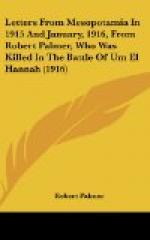I am,
Yours very sincerely,
(Signed) AUBREY HERBERT.
* * * * *
APPENDIX I.
THE OFFICIAL ACCOUNT OF THE BATTLE TAKEN FROM SIR
PERCY
LAKE’S DESPATCH TO THE WAR OFFICE, PUBLISHED
OCTOBER, 1916.
It will be noticed that it differs from the private accounts in one or two particulars.
1st phase—January 19—23.
After the battle of Wadi River General Aylmer’s leading troops had followed the retreating Turks to the Umm-el-Hannah position, and entrenched themselves at the mouth of the defile, so as to shut the enemy in and limit his power of taking the offensive.
The weather at this period was extraordinarily unfavourable. Heavy rains caused the river to come down in flood and overflow its banks, and converted the ground on either bank into a veritable bog.
Our bridge across the Wadi was washed away several times, while the boisterous winds greatly interfered with the construction of a bridge across the Tigris, here some 400 yards in width.
It was essential to establish Artillery on the right bank of the Tigris, so as to support, by enfilading fire, the attack of our Infantry against the Hannah position.
Guns and troops were ferried across, with difficulty, owing to the high wind and heavy squalls of rain, but by the 19th all troops allotted to the right bank had crossed over and were established in the positions from which they were required to co-operate with the main force on the left bank.
Meanwhile, the leading Infantry Brigades on the left bank had pushed nearer the enemy. January 20th was devoted to a systematic bombardment of his position, and during the night the Infantry pushed forward their advanced line to within 200 yards of the enemy’s trenches.
On the morning of the 21st, under cover of an intensive Artillery bombardment, our Infantry moved to the attack. On our right the troops got to within 100 yards of the enemy’s line, but were unable to advance further. Our left column, consisting of the Black Watch, 6th Jats, and 41st Dogras, penetrated the front line with a rush, capturing trenches, which they held for about an hour and a half. Supports were sent forward, but, losing direction and coming under heavy fire, failed to reach them. Thus, left unsupported, our previously successful troops, when Turkish counter-attacks developed, were overwhelmed by numbers and forced to retire.
Heavy rain now began to fall and continued throughout the day. Telephone communication broke down, and communication by orderly became slow and uncertain.
After further artillery bombardment the attack was renewed at 1 p.m., but by this time the heavy rain had converted the ground into a sea of mud, rendering rapid movement impossible. The enemy’s fire was heavy and effective, inflicting severe losses, and though every effort was made, the assault failed.




